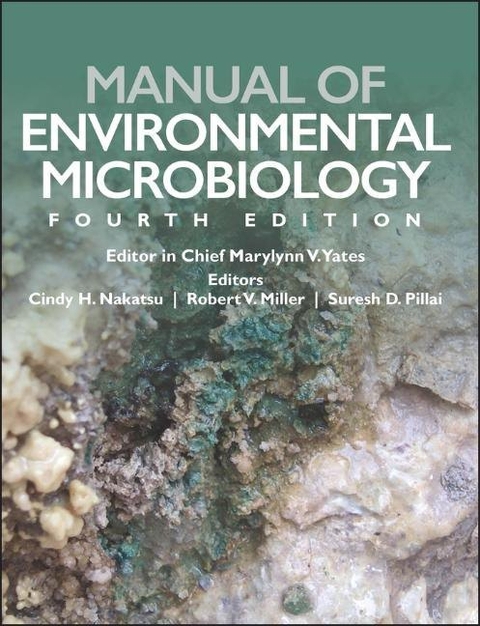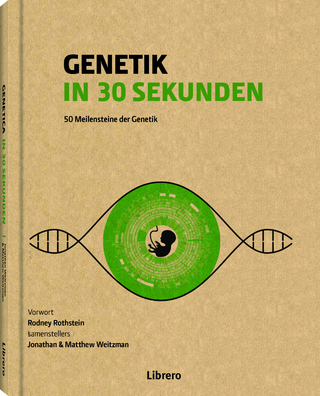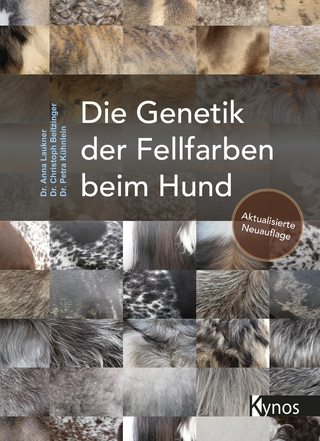
Manual of Environmental Microbiology
American Society for Microbiology (Verlag)
978-1-55581-602-5 (ISBN)
- Titel z.Zt. nicht lieferbar
- Versandkostenfrei innerhalb Deutschlands
- Auch auf Rechnung
- Verfügbarkeit in der Filiale vor Ort prüfen
- Artikel merken
The Manual is an essential reference for environmental microbiologists, microbial ecologists, and environmental engineers, as well as those interested in human diseases, water and wastewater treatment, and biotechnology.
The single most comprehensive resource for environmental microbiology
Environmental microbiology, the study of the roles that microbes play in all planetary environments, is one of the most important areas of scientific research. The Manual of Environmental Microbiology, Fourth Edition, provides comprehensive coverage of this critical and growing field.
Thoroughly updated and revised, the Manual is the definitive reference for information on microbes in air, water, and soil and their impact on human health and welfare. Written in accessible, clear prose, the manual covers four broad areas: general methodologies, environmental public health microbiology, microbial ecology, and biodegradation and biotransformation. This wealth of information is divided into 18 sections each containing chapters written by acknowledged topical experts from the international community.
Specifically, this new edition of the Manual
* Contains completely new sections covering microbial risk assessment, quality control,
and microbial source tracking
* Incorporates a summary of the latest methodologies used to study microorganisms in various environments
* Synthesizes the latest information on the assessment of microbial presence and microbial
activity in natural and artificial environments
The Manual of Environmental Microbiology is an essential reference for environmental microbiologists, microbial ecologists, and environmental engineers, as well as those interested in human diseases, water and wastewater treatment, and biotechnology.
Table of Contents
Editorial Board ix
Contributors xi
VOLUME I - INTRODUCTION
Chapter 1.1.1 Introduction
VOLUME II - GENERAL METHODOLOGY (Volume Editor: Suresh D. Pillai)
SECTION 2.1 - CULTURE-BASED AND PHYSIOLOGICAL DETECTION (Section Editor: Yoichi Kamagata)
Chapter 2.1.1 - Detection of specific taxa using chromogenic and fluorogenic media (Mohammad Manafi)
Chapter 2.1.2 - Anaerobic cultivation (Takashi Narihiro, Yoichi Kamagata)
Chapter 2.1.3 - New devices for cultivation (Yoshiteru Aoi, Slava Epstein)
SECTION 2.2 - MICROSCOPIC METHODS (Section Editor: Cleber Oeverney)
Chapter 2.2.1 - Gold-based in situ hybridization for phylogenetic single-cell detection of prokaryotes in environmental samples (Thilo Eickhorst, Hannes Schmidt)
Chapter 2.2.2 - Assessment of prokaryotic biological activity at the single cell level by combining microautoradiography and fluorescence in situ hybridization (FISH) (Cleber C. Ouverney)
SECTION 2.3 - TARGET-SPECIFIC DETECTION (Section Editor: Douglas R. Call)
Chapter 2.3.1 - Antibody-based technologies for environmental biodetection (Cheryl L. Baird, Susan M. Varnum)
Chapter 2.3.2 - PCR, real-time PCR, digital PCR and isothermal amplification (Rachel A. Bartholomew, Janine R. Hutchison, Timothy M. Straub, Douglas R. Call)
Chapter 2.3.3 - Microarray-Based Environmental Diagnostics (Darrell P. Chandler)
Chapter 2.3.4 - Field Application of Pathogen Detection Technologies (Timothy M. Straub, Douglas R. Call, Cindy Bruckner-Lea, Heather Colburn, Cheryl L. Baird, Rachel A. Bartholomew, Richard Ozanich, Kristin Jarman)
SECTION 2.4 - MICROBIAL COMMUNITY ANALYSIS OF ENVIRONMENTAL SAMPLES WITH NEXT GENERATION SEQUENCING (Section Editor: Stefan J. Green)
Chapter 2.4.1 - Introduction to Microbial community analysis of environmental samples with next-generation sequencing (Stefan J. Green, Josh D. Neufeld)
Chapter 2.4.2 - Microbial Community Analysis Using High-Throughput Amplicon Sequencing (Danny Ionescu, Will A. Overholt, Michael D. J. Lynch, Josh D. Neufeld, Ankur Naqib, Stefan J. Green)
Chapter 2.4.3 - Functional Metagenomics: Procedures and Progress (Laura S. Morris, Julian R. Marchesi)
Chapter 2.4.4 - Metagenomics: Assigning Functional Status to the Community Gene Content (Naseer Sangwan, Rup Lal)
Chapter 2.4.5 - Generation and Analysis of Microbial Metatranscriptomes (Neha Sarode, Darren J. Parris, Sangita Ganesh, Sherry L. Seston, Frank J. Stewart)
SECTION 2.5 - QA/QC IN ENVIRONMENTAL MICROBIOLOGY (Section Editor: Yildiz T. Chambers)
Chapter 2.5.1 - Introduction (Kevin K. Connell)
Chapter 2.5.2 - General Quality Control (Robin K. Oshiro)
Chapter 2.5.3 - Quality Control for Bacteriological Analyses (Ellen Braun-Howland)
Chapter 2.5.4 - Quality Control for Virological Analyses (Richard E. Danielson)
Chapter 2.5.5 - Quality Control for USEPA Method 1623 Protozoan Analysis and PCR Analyses (George D. Di Giovanni, Gregory D. Sturbaum)
Chapter 2.5.6 - The Role of Statistical Thinking Statistical Thinking in Environmental Microbiology (J. Vaun McArthur, R. Cary Tuckfield)
Chapter 2.5.7 - Study Design (Yildiz T. Chambers, Robin K. Oshiro)
SECTION 2.6 - SAMPLING METHODS (Section Editor: J. Scott Meschke)
Chapter 2.6.1 - Water Sampling and Processing Techniques for Public Health-Related Microbes (Vincent Hill)
Chapter 2.6.2 - Surface Sampling (Laura J. Rose, Judith Noble-Wang, Matthew J. Arduino)
Chapter 2.6.3 - Soil Sampling for Microbial Analyses (John Brooks)
Chapter 2.6.4 - Microbiological Sampling of Wastewater and Biosolids
VOLUME III - ENVIRONMENTAL PUBLIC HEALTH MICROBIOLOGY (Volume Editor: Marylynn V. Yates)
SECTION 3.1 - WATER (Section Editor: Gary Toranzos)
Chapter 3.1.1 - Detection of Microbial Indicators in Environmental Freshwaters and Drinking Waters (Tasha M. Santiago-Rodriguez, Julie Kinzelman, Gary A. Toranzos)
Chapter 3.1.2 - Best Practices for Cyanobacterial Harmful Algal Bloom Monitoring (Timothy G. Otten, Hans W. Paerl)
Chapter 3.1.3 - Assessing the Efficiency of Wastewater Treatment (Graciela I. Ramirez toro, Harvey Minnigh)
Chapter 3.1.4 - Epidemiologic Aspects of Waterborne Infectious Disease (Samuel Dorevitch)
Chapter 3.1.5 - Waterborne Enteric Viruses: Diversity, Distribution and Detection (Morteza Abbaszadegan, Absar Alum)
Chapter 3.1.6 - Detection of Protozoa in Surface and Finished Waters (Absar Alum, Eric N. Villegas, Scott P. Keely, Kelly R. Bright, Laura Y. Sifuentes, Morteza Abbaszadegan)
Chapter 3.1.7 - Drinking Water Microbiology
SECTION 3.2 - AEROBIOLOGY (Section Editor: Mark P. Buttner)
Chapter 3.2.1 - Introduction to aerobiology (Paula Krauter, Linda D. Stetzenbach)
Chapter 3.2.2 - Sampling for Airborne Microorganisms (Sergey A. Frinshpun, Mark P. Buttner, Gediminas Mainelis, Klaus Willeke)
Chapter 3.2.3 - Analysis of Bioaerosol Samples (Patricia Cruz, Mark P. Buttner)
Chapter 3.2.4 - Fate and Transport of Microorganisms in Air (Gary S. Brown, Alan Jeff Mohr)
Chapter 3.2.5 - Airborne Fungi and Mycotoxins (De-Wei Li, Eckardt Johanning, Chin S. Yang)
Chapter 3.2.6 - Airborne Bacteria and Endotoxin (Peter S. Thorne, Caroline Duchaine, Pascale Blais Lecours)
Chapter 3.2.7 - Airborne Viruses (Syed A. Sattar, Nitin Bhardwaj, M. Khalid Ijaz)
Chapter 3.2.8 - Aerobiology of Agricultural Pathogens (Estelle Levetin)
Chapter 3.2.9 - Legionellae and Legionnaires' Disease (Claressa E. Lucas)
SECTION 3.3 - SOIL (Section Editor: Ed Topp)
Chapter 3.3.1 - Pathogenic Viruses and Protozoa Transmitted by Soil (Pascal Delaquis, Julie Brassard, Alvin Gajadhar)
Chapter 3.3.2 - Natural soil reservoirs for human pathogenic and fecal indicator bacteria (Maria Laura Boschiroli, Joseph Falkinham, Sabine Favre-Bonte, Sylvie Nazaret, Pascal Piveteau, Michael Sadowsky, Murulee Byappanahalli, Pascal Delaquis, Alain Hartmann)
SECTION 3.4 - MICROBIAL SOURCE TRACKING (Section Editor: Valerie J. Harwood)
Chapter 3.4.1 - The Evolving Science of Microbial Source Tracking (Valerie J. Harwood, Charles Hagedorn, Michael Sadowsky)
Chapter 3.4.2 - Validation of microbial source tracking markers and detection protocols: considerations for effective interpretation (Asja Korajkic, Don Stoeckel, John F. Griffith)
Chapter 3.4.3 - Overview of Microbial Source Tracking Methods Targeting Human Fecal Pollution Sources (Orin C. Shanks, Hyatt Green, Asja Korajkic, Katharine G. Field)
Chapter 3.4.4 - Methods of targeting animal sources of fecal pollution in water (Anicet R Blanch, Elisenda Balleste, Jennifer Weidhaas, Jorge Santo Domingo, Hodon Ryu)
Chapter 3.4.5 - MST: Field Study Planning and Implementation (Julie Kinzelman, Warish Ahmed)
Chapter 3.4.6 - Fecal Indicator Organism Monitoring and Microbial Source Tracking in Environmental Waters: Overview of Existing Modeling Efforts (Meredith B. Nevers, Muruleedhara N. Byappanahalli, Mantha S. Phanikumar, and Richard L. Whitman)
SECTION 3.5 - MICROBIAL RISK ASSESSMENT (Section Editor: Marylynn V. Yates)
Chapter 3.5.1 - Dose Response Modeling and Use-Challenges and Uncertainties in Environmental Exposure (Mark H. Weir)
Chapter 3.5.2 - Exposure assessment (Susan Petterson, Nicholas Ashbolt)
Chapter 3.5.3 - Dose-Response Modeling and Use: Challenges and Uncertainties in Environmental Exposure (Mark H. Weir)
VOLUME IV - MICROBIAL ECOLOGY (Volume Editor: Robert V. Miller)
SECTION 4.1 - THEORY (Section Editor: Larry Forney)
Chapter 4.1.1 - Phylogenomic Networks of Microbial Genome Evolution (Tal Dagan, Ovidiu Popa, Thorsten Kloesges, Giddy Landan)
Chapter 4.1.2 - Evolutionary ecology of microorganisms: from the tamed to the wild (Jay T. Lennon, Vincent J. Denef)
SECTION 4.2 - AQUATIC ENVIRONMENTS (Section Editor: Robert H. Findlay)
Chapter 4.2.1 - The Microbial Ecology of Benthic Environments (Robert H. Findlay, Tom J. Battin)
Chapter 4.2.2 - Heterotrophic Planktonic Microbes: Viruses, Bacteria, Archaea, and Protozoa (Jed A. Fuhrman, David A. Caron)
Chapter 4.2.3 - Aquatic Biofilms: Development, cultivation, analyses, and applications (John R. Lawrence, Thomas R. Neu, Armelle Paule, Darren R. Korber, Gideon M. Wolfaardt)
SECTION 4.3 - EXTREME ENVIRONMENTS (Section Editor: Brian Hedlund)
Chapter 4.3.1 - The Microbiology of Extremely Acidic Environments (D. Barrie Johnson, Angeles Aguilera)
Chapter 4.3.2 - Life in High Salinity Environments (Aharon Oren)
Chapter 4.3.3 - Microbial life in extreme low-biomass environments - a molecular approach (Kasthuri Venkateswaran, Myron T. La Duc, Parag Vaishampayan, James A. Spry)
Chapter 4.3.4 - Life in High-Temperature Environments (Brian Hedlund, Scott Thomas, Jeremy Dodsworth, Chuanlun Zhang)
SECTION 4.4 - ANIMAL-GUT MICROBIOMES (Section Editor: Julian Marchesi)
Chapter 4.4.1 - Invertebrate-gut associations (Daniele Daffonchio, Alberto Alma, Guido Favia, Luciano Sacchi, Claudio Bandi)
Chapter 4.4.2 - Studying the mammalian intestinal microbiome using animal models (Floor Hugenholtz, Jing Zhang, Paul W. O'Toole, Hauke Smidt)
Chapter 4.4.3 - Animal Gut Microbiomes (Richard J Ellis, Chris McSweeney)
VOLUME V - BIODEGRADATION AND BIOTRANSFORMATION (Volume Editor: Cindy H. Nakatsu)
SECTION 5.1 - BIODEGRADATION (Section Editor: Cindy H. Nakatsu)
Chapter 5.1.1 - Genomic Features and Genome-Wide analyses of Dioxin-Like Compound Degraders (Masaki Shintani and Kazuhide Kimbara)
Chapter 5.1.2 - Biodegradation of organochlorine pesticides (Yuji Nagata, Michiro Tabata, Yoshiyuki Ohtsubo, Masataka Tsuda)
Chapter 5.1.3 - Anaerobic degradation of aromatic compounds (Weimin Sun, Valdis Krumins, Donna E. Fennell, Lee J. Kerkhof, Max M. Haggblom)
Chapter 5.1.4 - Microbial electrochemical technologies producing electricity and valuable chemicals from biodegradation of waste organic matters (Taeho Lee, Akihiro Okamoto, Sokhee Jung, Ryuhei Nakamura, Jung Rae Kim, Kazuya Watanabe, Kazuhito Hashimoto)
Chapter 5.1.5 - A basic introduction to aerobic biodegradation of petroleum aromatic compounds (Kengo Inoue, Onruthai Pinyakong, Kano Kasuga, Hideaki Nojiri)
Chapter 5.1.6 - Environmental systems microbiology of contaminated environments (Terry C. Hazen, Gary S. Sayler)
SECTION 5.2 - BIOTRANSFORMATION (Section Editor: Chris Rensing)
Chapter 5.2.1 - Breathing Iron: Molecular Mechanism of Microbial Iron Reduction by Shewanella oneidensis (Rebecca E. Cooper, Jennifer L. Goff, Ben C. Reed, Ramanan Sekar, Thomas J. DiChristina)
Chapter 5.2.2 - Experimental Geomicrobiology: From Field to Laboratory (Timothy S. Magnuson, Rhesa N. Ledbetter)
Chapter 5.2.3 - Restoration of Metal(loid) Contaminated Soils (Timberley Roane, Munira Lantz)
Index
| Erscheinungsdatum | 09.02.2016 |
|---|---|
| Reihe/Serie | ASM Books |
| Mitarbeit |
Chef-Herausgeber: Marylynn V. Yates |
| Sprache | englisch |
| Maße | 218 x 279 mm |
| Gewicht | 2676 g |
| Themenwelt | Naturwissenschaften ► Biologie ► Genetik / Molekularbiologie |
| Naturwissenschaften ► Biologie ► Mikrobiologie / Immunologie | |
| ISBN-10 | 1-55581-602-9 / 1555816029 |
| ISBN-13 | 978-1-55581-602-5 / 9781555816025 |
| Zustand | Neuware |
| Informationen gemäß Produktsicherheitsverordnung (GPSR) | |
| Haben Sie eine Frage zum Produkt? |
aus dem Bereich


